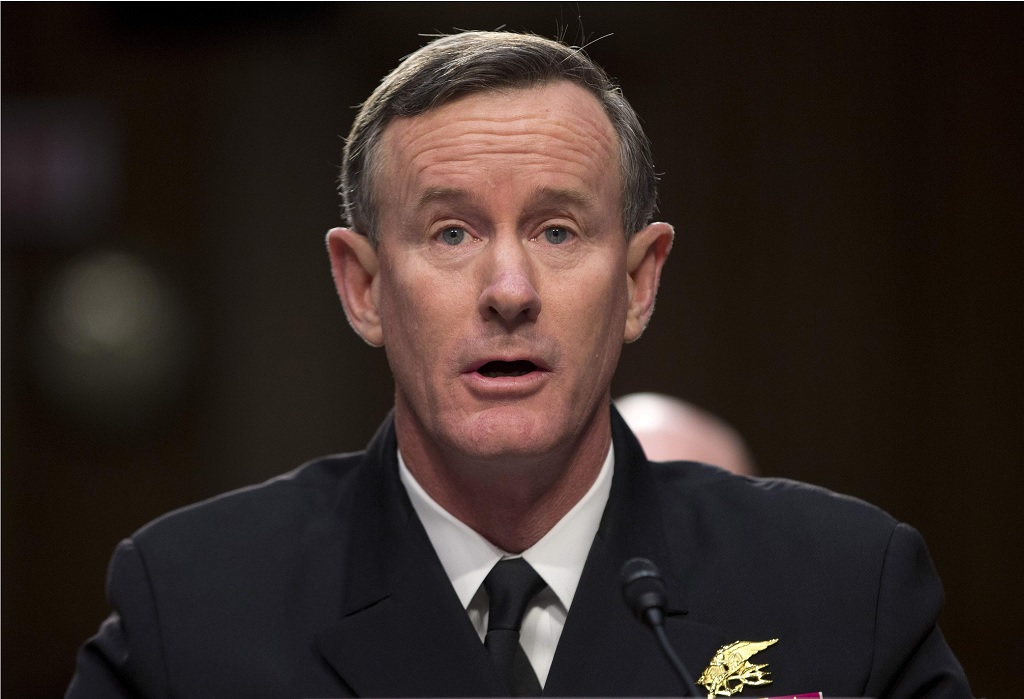The Tampa Tribune / TBO.com
Military News

PALM HARBOR — William McRaven laughed when asked about the highlights of his remarkable life, more than half of it spent in uniform as a Navy SEAL.
Sitting down to talk with The Tampa Tribune, McRaven said if he were remembered only as the guy who told college students to make their beds, “I’m happy that’s it.”
But that message from his 2014 commencement speech to the graduating class of the University of Texas at Austin, on the importance of starting the day right, might not make the McRaven legacy list in the minds of many others.
Already a star in the shadowy world of quiet professionals, McRaven was head of Joint Special Operations Command when he engineered the raid that killed Osama bin Laden in 2011. He came to MacDill Air Force Base later that year, just the second SEAL admiral to run U.S. Special Operations Command, and served here until his retirement in 2014.
Now chancellor of the University of Texas System, McRaven talked about the raid, his time at Socom, rumors of his political aspirations and advice to those seeking the highest office in the land. He also talked about why the choice of his successor to run U.S. Central Command is “brilliant” and why more direct action is needed against the so-called Islamic State jihadi group.
He also made an argument that while the bin Laden raid may be his most famous moment, it was not his biggest contribution to the world of special operations.
McRaven, now 60, returned to the Tampa area this week to receive a lifetime achievement award from the Global SOF Foundation during its second annual symposiumat the Innisbrook resort in Palm Harbor..
But one of McRaven’s most significant achievements has been something he is most reluctant to discuss.
Almost four years ago, he dismissed the tactical success of the May 1, 2011, raid by Navy SEALs on bin Laden’s compound in Abbottabad, Pakistan, as “not really very sexy.”
Pushed to talk about it Thursday, McRaven said it has taken time to come to grips with the public significance of the bin Laden raid, “because that moment’s kind of gone.”
“To be honest with you, . I look back and that was one moment in 37 years and I am very proud of what the guys did and I’m very proud of the mission. But I really look at what we … did in the totality. So I look back particularly since 9/11 and the incredible work of the soldiers, sailors, airmen and Marines of special operations and that’s really what you take the best pride in.”
Repeating a familiar refrain, McRaven heaped praise on the White House and the intelligence community aside from the SEALs.”
When asked what it was like to see the body of bin Laden after the raid, as depicted in the book “No Easy Day” and the movie “Zero Dark Thirty,” McRaven again laughed.
“Who told you I saw him?” he asked. “I haven’t talked about the raid. I try to stay away from it.”
But he did acknowledge that eventually, the gravity of the moment sunk in.
“I can tell you I’m not sure I appreciated the historic significance of the mission and it wasn’t really until many months later that I was invited up to New York City to receive the federal law enforcement award,” he said. “There were 2,000 cops … there and it was at that point in time that it really resonated with me what it meant to the people of New York and what it what it meant to other people in the country and the world and so I was, again, particularly proud of it from that respect.”
It was a shining moment for McRaven, special operations and intelligence, the White House and for the nation as a whole.
But even more important, when it comes to special operations, is what McRaven did when he got to Tampa.
Aside from building relations between top military officers who lead commands like Centcom, McRaven lists caring for commandos and their families, and strengthening the special operations tools available to commanders as key contributions.
Saying the tremendous pace of deployments had left his force “frayed,” McRaven created the “Preservation of Force and Families” program, worth hundreds of millions of dollars over five years, to increase “the physical, mental and spiritual capacity” of commandos.
“We needed to make sure we were taking care of the troops,” McRaven said.
But there was push back from Congress, with tens of millions of dollars slashed from the program’s budget.
“As you know, I got resistance from certain parts of the U.S. government. But everybody came around and we appropriately funded it and I still get calls from family members of soldiers who benefited from Preservation of the Force and Families telling me how much they appreciate what we did for their husband or their wife and that‘s pretty gratifying.” The other major accomplishment for McRaven was getting greater control of the lower commands called Theater Special Operations Commands, which provide command and control of special operations forces for headquarters like Centcom. Centcom oversees U.S. military operations in most of the Middle East and Southwest Asia.
It was like better stocking a tool box for commanders like Centcom head Gen. Lloyd Austin to use at their discretion.
But it was an effort that led to questions about whether McRaven was trying to take over the military, something he vehemently denied.
“I know there was a little suspicion that it was this attempt to have Socom become a global command and control effort. And frankly, I told folks it was not my intent. It was never my intent. My intent was to better serve the combatant commanders.”
McRaven acknowledged it took time for the other four-star top officers to get comfortable with the concept of Socom having greater control over the lower, operational commands, known as TSOCs.
Given that authority by then-Defense Secretary Leon Panetta in 2011, McRaven said “it probably took a year before the combatant commanders got very, very comfortable with the fact.”
The bottom line, McRaven said, is that those lower commands now have more resources while still under control of commanders like Austin. And that, he said, is better for the military.
McRaven can’t say enough good things about the choice of his successor, fellow special operations veteran Army Gen. Joseph Votel, to replace Austin at Centcom.
“I think it is a brilliant move. You you know Joe has such incredible experience, both with the big Army and obviously with special operations. Centcom is clearly one of those combatant commands where the conflation and the coming together of special operations and the larger services is so very, very important.”
Votel “has spent an incredible amount of time in theater, so my guess is that his transition will not take very long. He won’t have a steep learning curve, because he knows all the players in the Middle East. He knows what all the issues are.”
McRaven, however, doesn’t necessarily buy into the prevailing view that the choice of Votel is a signal of the primacy of special operations.
“I’m not sure it is necessarily about special operations. I think it is about Joe Votel and his qualifications to do the job. Now, clearly, part of those qualifications are his special operations background but I think this is more about Joe being a magnificent officer.”
So, too, he said, is Army Lt. Gen. Raymond Anthony “Tony” Thomas III, the current Joint Special Operations Command leader widely reported to be taking Votel’s place.
“Much like Joe Votel, he brings a tremendous amount of experience, especially in the region,” said McRaven, careful to point out that Thomas had yet to be officially named, let alone confirmed.
“I look at Votel and Thomas as two of the most experienced, if not the most experienced special operations officers in the Centcom (region), and of course, Tony has served around the globe and also has great depth of experience with the joint commands, with the big Army.
“And of course their personal relationship is very, very strong and there is nothing quite like a personal relationship between the Socom commander and the Centcom commander to make that all work very well.”
Much has been made over the years about whether McRaven has political ambitions, and he denied he does. Someone even created a ClintonMcRaven2016.com website, which has no real content.
“I’ve heard of it,” McRaven said with a chuckle. “I love my job as the chancellor of the University of Texas, it is a fabulous job that gives me an opportunity, much like in the military, to be able to shape lives. I’ve got 217,000 students and 90,000 faculty and staff. It’s a great position and I have no intent of leaving that position any time soon.”
McRaven declined to talk about whether any of the presidential candidates has reached out to him to serve in any capacity.
“I wouldn’t tell you even if they had,” he said, adding that he is not supporting any candidate.
He does, however, have advice.
“Whoever comes into the White House, Democrat or Republican, is going to have to deal very strongly with the problems we see in the Middle East and in North Africa with the spread of ISIS,” he said. “Whoever comes in as commander in chief will have to realize that the United States is going to have to lead. There are always discussions about how we need to have our Arab partners lead and we need to have our European partners lead. In my opinion, unless the United States leads, we’re not going to be able to … solve the problems,”
So what’s the best way to deal with the so-called Islamic State jihadi group?
McRaven described the problem as a “Gordian knot.”
“There are those out there that want to pull the strands of the Gordian knot out one by one. I do think we are at the point, and I have believed this for some time, that this Gordian knot probably requires a very swift sword to just cut in two.
“And by that it’s not to say we shouldn’t value some of the nuanced approaches … clearly we have to get the message right. We clearly have to build coalitions, but at the end of the day, direct action, and a significant amount of direct action, does in fact have an impact. I’ve seen it many times over the years.”
It’s no easy task.
“You have to build support form the tribal leaders where you can do that, with the moderates where you can do that, but where you can’t, you have to be swift and hard and decisive.”
Is he satisfied that’s happening now?
“I’m satisfied that it’s getting better. I think the president needs to talk to those folks who do this for a living at Centcom and Socom. I’ve been out of it for a little over a year now, and one of the things I learned very quickly is when you haven’t done this for a year’s period of time, you’re already obsolete.”

Original URL: https://www.tbo.com/list/military-news/mcraven-now-appreciates-impact-in-us-of-his-bin-laden-raid-20160225/

